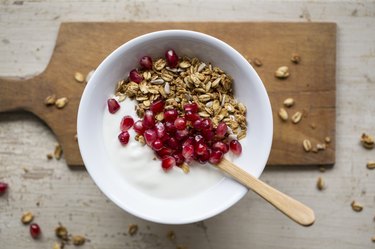
Probiotics represent a form of supplemental "good" bacteria that inhabit your colon. If you are healthy, follow a healthy diet full of probiotic foods and are void of serious digestive disease, the use of probiotic supplements is unnecessary.
Those with certain issues or imbalances may benefit from supplemental forms of probiotics in your diet. However, no industry standard exists for dosing per ailment and the duration of using probiotics varies as well.
Video of the Day
Video of the Day
Since your body works to naturally maintain a healthy balance of these "good" bacteria, there's no need to take probiotic supplements regularly. Instead, once your symptoms improve, it may be time to stop taking them. Of course, since this is a medical decision, it's best to consult with your doctor. She will be able to best determine if probiotics are helpful for your ailments, which ones you should take and for how long.
Tip
The duration that you take probiotics for is directly related to the ailment for which you are taking them. While there are some general guidelines, it's best to consult with your physician to determine the best course of treatment.
The Probiotic Basics
Your colon is host to trillions of bacteria, mostly harmless and serving the purpose of keeping harmful bacteria from disrupting digestion or causing infectious disease. Illness lowered immunity, stress, poor diet, or taking antibiotic medications can deplete your healthy gut bacteria, thus allowing pathogens to wreak havoc on your colon.
Probiotic supplements are microorganisms similar to your naturally created bacteria, offer an alternative source of boosting colon bacteria in the event your body cannot nurture its own bacteria levels. It is a common misconception that probiotics are like common vitamins that should be taken daily to maintain proper nutritional levels. However, that is not the case; they are a tool that can help certain ailments but not a supplement needed daily.
When probiotics are administered in adequate amounts, they are believed to induce health benefits. But limited evidence exists supporting use and the various species and strains may not permit the same benefits per person, notes the National Center for Complementary and Alternative Medicine.
Duration of Use
The exact length of using probiotics is as difficult a question to answer since the forms you should use are specific to your ailments. According to Harvard Health, daily use for one to two weeks may improve infectious or antibiotic-related diarrhea. MedlinePlus provides a list of several different ailments that can be benefited through probiotic supplements.
They note that dosages can range from one to ten billion organisms taken three to four times daily, noting again that the duration depends on the ailment. For instance, they recommend taking probiotics for 12 weeks to help with hayfever and four to eight weeks of dosages for constipation.
While the Medline Plus list is a handy tool for quick referencing, it's essential to talk to a doctor when deciding to start on a probiotic dosage. As you can see, the reason for taking the probiotic directly impacts the duration in which you should take the supplement. So, talk to your doctor about the right probiotic dosage for your ailments.
Effective Probiotic Use
Probiotic foods are the recommended source for achieving health benefits. Fermented and non-fermented milk, yogurt, soy beverages and juice drinks often have probiotics added. There are also options such as kefir, miso and kimchi. In choosing a food product look for the label to read "live and active cultures." Probiotics can die in high temperatures, so keep food products cold unless product labeling indicates otherwise.
To get the desired probiotic side effects, there needs to millions to trillions of the microorganisms in the supplemental product and you may have to consume two or three servings a day. Eating probiotic foods simplifies the process by providing healthy bacteria to your system in regular doses through your meals. Check the label for instructions or contact the product manufacturer. Capsule and powder probiotic products should also have label instructions.
Just remember, probiotics are not intended to cure diseases, so do not forgo medical treatment if you have a legitimate medical problem. You may experience adverse probiotic side effects such as gas or bloating and long-term use safety concerns have not been thoroughly researched. If you are healthy and eat probiotic foods with adequate fiber, you do not need probiotics to nurture your healthy bacteria.